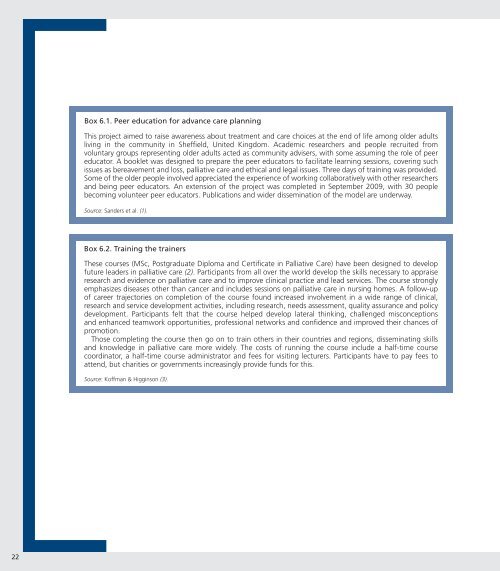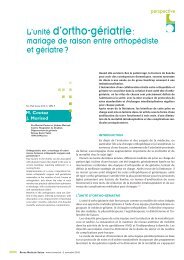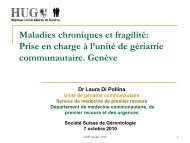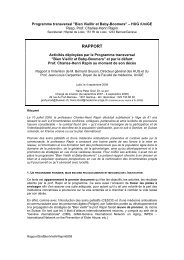Box 6.1. Peer education <strong>for</strong> advance <strong>care</strong> planningThis project aimed to raise awareness about treatment and <strong>care</strong> choices at the end of life among <strong>older</strong> adultsliving in the community in Sheffield, United Kingdom. Academic researchers and <strong>people</strong> recruited fromvoluntary groups representing <strong>older</strong> adults acted as community advisers, with some assuming the role of peereducator. A booklet was designed to prepare the peer educators to facilitate learning sessions, covering suchissues as bereavement and loss, palliative <strong>care</strong> and ethical and legal issues. Three days of training was provided.Some of the <strong>older</strong> <strong>people</strong> involved appreciated the experience of working collaboratively with other researchersand being peer educators. An extension of the project was completed in September 2009, with 30 <strong>people</strong>becoming volunteer peer educators. Publications and wider dissemination of the model are underway.Source: Sanders et al. (1).Box 6.2. Training the trainersThese courses (MSc, Postgraduate Diploma and Certificate in <strong>Palliative</strong> Care) have been designed to developfuture leaders in palliative <strong>care</strong> (2). Participants from all over the world develop the skills necessary to appraiseresearch and evidence on palliative <strong>care</strong> and to improve clinical practice and lead services. The course stronglyemphasizes diseases other than cancer and includes sessions on palliative <strong>care</strong> in nursing homes. A follow-upof <strong>care</strong>er trajectories on completion of the course found increased involvement in a wide range of clinical,research and service development activities, including research, needs assessment, quality assurance and policydevelopment. Participants felt that the course helped develop lateral thinking, challenged misconceptionsand enhanced teamwork opportunities, professional networks and confidence and improved their chances ofpromotion.Those completing the course then go on to train others in their countries and regions, disseminating skillsand knowledge in palliative <strong>care</strong> more widely. The costs of running the course include a half-time coursecoordinator, a half-time course administrator and fees <strong>for</strong> visiting lecturers. Participants have to pay fees toattend, but charities or governments increasingly provide funds <strong>for</strong> this.Source: Koffman & Higginson (3).22
Box 6.3. European Association <strong>for</strong> <strong>Palliative</strong> Care core curricula recommendations <strong>for</strong> psychologistsThe Task Force on Education <strong>for</strong> Psychologists in <strong>Palliative</strong> Care is an initiative of the EAPC with the goalof developing European guidelines <strong>for</strong> quality, practice and education of psychologists in palliative <strong>care</strong> (4).The Task Force aims to gather in<strong>for</strong>mation about the varying roles, professional identities and education ofpsychologists in European countries; to define essential competencies <strong>for</strong> psychologists working in fields ofpalliative <strong>care</strong> (such as direct patient consultation, education, management and research) and to develop acommon curriculum. This is conducted through needs assessment among psychologists themselves, patients,relatives and staff about the desired support by a psychologist and, finally, a consensus process.Similar task <strong>for</strong>ces are in place to develop core competencies and curricula <strong>for</strong> education and training of otherprofessionals, such as:• nurses (5);• physicians, with a curriculum in palliative <strong>care</strong> <strong>for</strong> undergraduate medical education (6) and a postgraduatecurriculum in preparation (7); and• neurologists (8).Sources: personal communications, Sheila Payne, International Observatory on End of Life Care, Lancaster University, United Kingdom andSaskia Jünger, University Clinic Aachen, Germany.References1. Sanders C et al. Development of a peer education programme<strong>for</strong> advance end-of-life <strong>care</strong> planning. International Journal of<strong>Palliative</strong> Nursing, 2006, 12:214–223.2. <strong>Palliative</strong> <strong>care</strong> courses, MSc, diploma and certificate [web site].London, King’s College London, 2010 (http://www.kcl.ac.uk/schools/medicine/depts/palliative/spc, accessed 1 December2010).3. Koffman J, Higginson IJ. Assessing the effectiveness andacceptability of inter-professional palliative <strong>care</strong> education.Journal of <strong>Palliative</strong> Care, 2005, 21:262–269.4. Education <strong>for</strong> Psychologists in <strong>Palliative</strong> Care – an EAPC TaskForce [web site]. Milan, European Association <strong>for</strong><strong>Palliative</strong> Care, 2010 (http://www.eapcnet.org/projects/Psychologists.html, accessed 1 December 2010).5. De Vlieger M et al. A guide <strong>for</strong> the development of palliativenurse education in Europe. Milan, European Association<strong>for</strong> <strong>Palliative</strong> Care, 2004 (http://www.eapcnet.org/projects/nursingeducation.html, accessed 1 December 2010).6. EAPC Task Force on Medical Education. Curriculum in palliative<strong>care</strong> <strong>for</strong> undergraduate medical education: recommendationsof the European Association <strong>for</strong> <strong>Palliative</strong> Care. Milan,European Association <strong>for</strong> <strong>Palliative</strong> Care, 2007 (http://www.eapcnet.org/projects/TF-EducForPhys.html, accessed 1 December2010).7. EAPC Task Force on Medical Education. For the developmentof postgraduate curricula leading to certification in palliativemedicine: recommendations of the European Association <strong>for</strong><strong>Palliative</strong> Care. Milan, European Association <strong>for</strong> <strong>Palliative</strong> Care,2009 (http://www.eapcnet.org/projects/TF-EducForPhys.html,accessed 1 December 2010).8. The development of guidelines and a core curriculum <strong>for</strong> thepalliative <strong>care</strong> <strong>for</strong> <strong>people</strong> with neurological disease – an EAPCtask <strong>for</strong>ce [web site]. Milan, European Association <strong>for</strong> <strong>Palliative</strong>Care, 2009 (http://www.eapcnet.org/projects/Neurology.html,accessed 1 December 2010).23
















